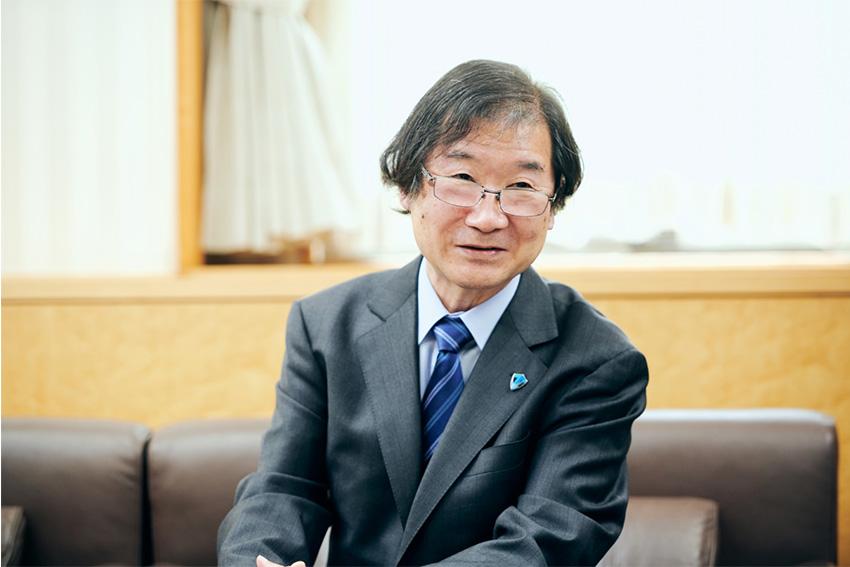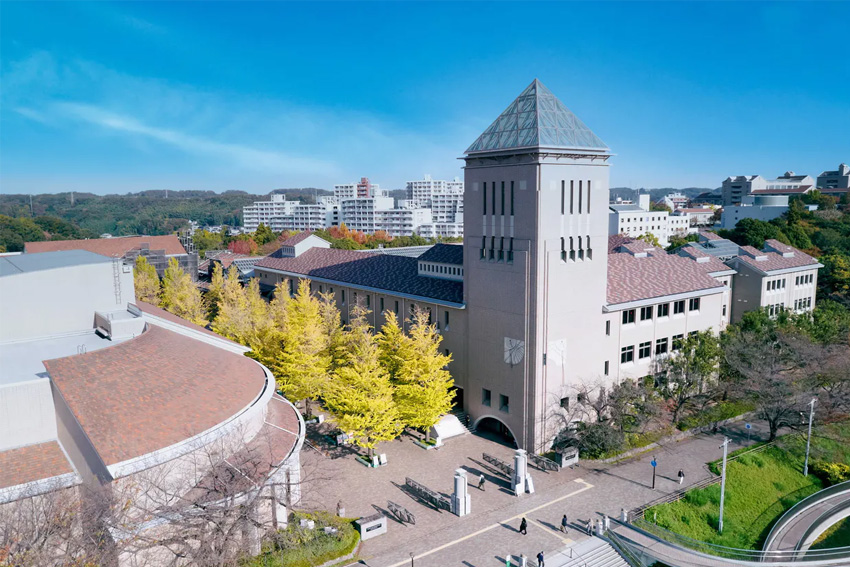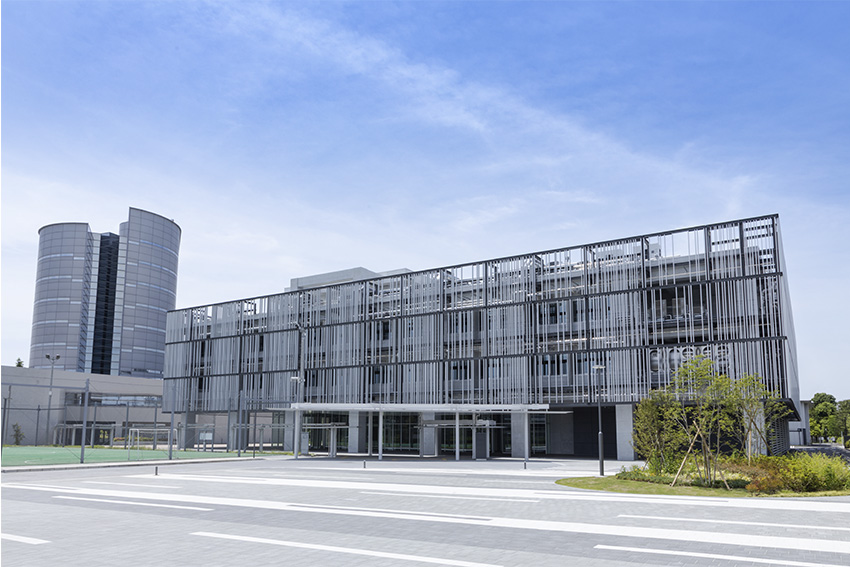Tokyo Metropolitan University is striving to realize an ideal metropolitan society by utilizing scholarships, collaboration, and word-class research.

One of Japan’s challenges is its declining population. Compared to other nations, Japan lacks labor force globalization, which is leading to bottlenecks in production and worker shortages. To try to tackle this problem, the government has set ambitious targets to attract 400,000 students from overseas to Japan. What role can universities play in tackling these challenges?
Tokyo Metropolitan University (TMU) hosts about 600 international students, the majority of whom are engaged in graduate studies. However, considering the long-term perspective, it is imperative that we augment the number of undergraduate students who pursue their education and secure employment in Japan post-graduation. This strategy would undeniably contribute to offsetting the anticipated labor shortages in the forthcoming years.
Students from Southeast Asia in particular, hold Japan in high esteem; they are fond of Japanese culture, cuisine, and the lifestyle of Japanese people. I am of the conviction that Japan needs to capitalize on certain facets to allure these young individuals from Asia. To this end, we work to develop programs taught in English. Our English-instructed offerings are currently confined to a comprehensive degree program in Biological Science and selected graduate courses. We acknowledge the necessity to diversify our English-taught programs to attract a larger cohort of international students, which will concurrently enhance the internationalization of Japanese students.
When it comes to foreign students seeking employment in Japan, language barriers pose a significant challenge. Our comprehensive Japanese language program, accessible to international students, encompasses 39 courses spanning proficiency levels from beginner to advanced. International students have the opportunity to study Japanese within this language program while pursuing their primary field of study in English. As they acquire the language skills throughout the natural course of the program, their prospects of employability within Japan or in roles connected to Japan post-graduation are naturally enhanced.
Additionally, we are in the midst of developing an internship program for international students. This program will assist international students, from Asian countries particularly, in overcoming obstacles to gaining work experience during their studies with the ultimate goal of finding employment in Japan post-graduation.
At our university, the Graduate School of Human Health Sciences offers a unique program to admit and educate qualifying students from Asian countries, with the aim of preparing them for careers as medical professionals. Upon completing their education, they may assume significant roles in the medical field in their respective home countries. Through these programs and initiatives, our aim is to forge and strengthen partnerships with Asian universities, fostering positive synergies across teaching, research, and workforce development that will also contribute to tackling Japan's challenge of labor force globalization.

Japan is one of the safest countries globally, and we are now seeing more and more universities like yours that have a broad range of English courses available. Additionally, with the weakened JPY, Japan has never been more cost-effective as a location to receive top-quality education. However, when you look at the level of foreign students in Japan, it paints a different story; only 5% of all students come from outside of the country, a small number compared to the United States, for example, having 40% of its students coming from abroad. You’ve mentioned earlier the importance of language. Do you think there are any other barriers that are standing in the way of international students from choosing Japan as an educational destination?
Language is indeed a significant barrier, and Japan’s unique cultural characteristics may be viewed as exclusive by young foreigners. In contrast with Europe’s cultural diversity, Japan is often perceived as a culturally homogeneous society, influenced by its history as an island nation. To become a more attractive educational destination, Japan must embrace a shift towards greater internationalization, a change that should extend from primary education to advanced academic levels. Exposing young Japanese students to a variety of foreign cultures at an earlier age is essential to ignite global interest, but it is a complex challenge.
Numerous systems and institutions in Japan are not yet fully equipped to accommodate international students, as seen by the limited number of English-taught programs and career opportunities for foreign students. By progressively improving these aspects, Japan can enhance its appeal to international students.; however, this transformation will require time and concerted effort. Other nations such as those in Europe and the United States have already made strides in opening their universities to students from all over the world. Japan must follow suit and implement similar measures to increase its global educational presence.
Do you believe the onus is primarily on the government to set up a system to do so?
The responsibility for accommodating international students is indeed a shared one. While a fully open policy by the Japanese government could lead to rapid and potentially overwhelming changes, it is crucial to manage this process thoughtfully. Japan is currently adjusting to the increased influx of tourists, and a sudden surge could exacerbate existing problems. The nation needs a measured approach to adaptation. Nevertheless, I firmly believe that universities have a pivotal role to play in this transition and should lead the way in opening our doors to the international community.
Diversity is something clearly shown in your TMU Vision 2030. A key part of that vision was a focus on reacting to the future, but specifically how the future should be rather than the feasibility of the future. The main tenets of this plan are to foster continuous learning, collaboration, diversity, and an open campus. How can you ensure that this plan remains fluid with all of the rapid changes we are currently seeing in Japanese society?
Our TMU Vision 2030 represents the aspirational goals we aim to realize by the end of this decade. Every two years, we issue the President’s Policy to address pressing concerns and guide our university’s strategic direction, reflecting our senior leadership team discussions on matters of institutional and societal importance. It is essential to note that diversity, equality, and inclusion (DEI) are integral to these discussions, ensuring that these values remain central to our actions and decisions.
To actualize our commitment to diversity, we have established a Diversity Promotion Office, which organizes regular seminars to foster awareness and engagement. In May 2024, we celebrated our annual Diversity Week, featuring a series of lectures and dialogues that reflect our ongoing commitment to this cause.
However, we acknowledge the persistent challenge of achieving gender diversity, particularly within our faculty, where males predominate. This disparity is especially pronounced in science and engineering disciplines, where female representation is significantly lower. As we navigate the competitive landscape for recruiting female academics, we must consider the implications of female-specific hiring policies on our broader commitment to equality. We approach this with caution, recognizing the need to balance our recruitment strategies with our dedication to equitable practices.
Your Tokyo Global Partner Scholarship program is enabling students to come to Japan to study and contribute to Tokyo through international partnerships. Please tell us about some of the key initiatives within this plan and how bringing these students here will help achieve the goals that you have laid out.
The Tokyo Global Partner Scholarship Program traces its origins back to the Asian Human Resource Scholarship, established 16 years ago. Initially exclusive to students in Asia, the program later extended its reach to include students from Tokyo’s sister and friendship cities. This progression culminated in the recent development of the Global Partner Scholarship Program, reflecting our ongoing commitment to broadening educational opportunities and fostering international collaboration. As of March 31, 2024, we are proud to have established partnerships with approximately 170 universities worldwide.
Since its launch in 2008, the scholarship program has predominantly attracted graduate students from across Asia, reflecting our focus on this dynamic region. We provide comprehensive support to these students, covering their travel expenses and tuition fees, which underscores our dedication to nurturing high-caliber talent. Candidates for the scholarship program are selected based on their academic qualifications and often with endorsements from their professors who are engaged in research collaborations with our faculty. This highlights the strength of our academic networks and the value of personal endorsements in building our international community.
We understand that the program accepts around 150 students. Are you looking to expand the program and accommodate more?
We are actively exploring the possibility of expanding our program’s capacity beyond the current 150 students, in consultation with the Tokyo Metropolitan Government, our principal founder and a major source of funding. The government’s unwavering support has been pivotal to our internationalization efforts. With this strong partnership, we are confident that further collaboration will greatly enhance our programs and broaden our global reach. We are enthusiastic about the future developments of these initiatives.
A lot of the housing for your international students falls under your TMU International Center, where you can manage these international partnerships and collaborative programs and advise students looking to go abroad on an exchange. What kinds of support processes are in place to advise students who are going abroad as well as students coming to Japan from overseas locations?
The TMU International Center staffed by a dedicated team of six professors provides personalized guidance to each student. The Center serves as a hub for both inbound and outbound international students, offering comprehensive support for those seeking to study abroad and those joining us from overseas. Our commitment is to ensure that every student receives the information and assistance they need for a successful international academic experience.
The International Affairs Office, with approximately 30 administrative staff members, contemplates the Center’s efforts by advising and aiding students with the logistics of studying abroad.
Among their key initiatives is the Global Discussion Camp, a program that unites students from several universities around the world for a week at TMU to deliberate on global issues such as diversity, social challenges, and inclusion. Launched in 2019, the camp currently accommodates 24 students per session, and we are intent on increasing this number to allow more participants from TMU and our partner institutions to experience this valuable program.
Your university emphasizes a need for students to study across many disciplines in addition to their major. This allows students not only to study their major but also a structured course on another topic. Students at your university can look at a very broad range as well as take part in work experience and internships. How has this program helped students to develop skills beyond their major?
Currently, our university provides a suite of four minor courses, among which the Global Education Program may be relevant to the theme of this interview. This program, enrolling approximately 20 students annually from four of our faculties, exemplifies our dedication to interdisciplinary education. We are in the process of expanding this program to encompass additional faculties, including the Faculty of Law and the Faculty of Health Sciences. The program’s rigorous curriculum demands proficiency in academic writing and debate, alongside a compulsory semester abroad. Students conclude this program by presenting their overseas experiences at TMU, invariably showcasing their passion and delivering presentations of a high standard.
The value of supplementing major studies with skills like global awareness and debate is immeasurable. Our program’s distinctive approach allows students to engage with a variety of perspectives, fostering a comprehensive understanding that is vital for their future careers. This broadened outlook is not only advantageous for those seeking positions in international corporations but is also increasingly appreciated by Japanese firms as they expand their global footprint. This global orientation is a powerful incentive for our students, opening up a wealth of opportunities for them in the international job market.
The Japanese labor market can be very tight, making it difficult for outsiders to comprehend, understand, or navigate. You have to apply at certain times, and if you miss the dates, you miss your chance for six months. Can you explain to us how you can help foreign students navigate the challenges associated with the Japanese labor market?
To assist our students in navigating the complexities of the Japanese labor market, we offer specialized seminars that provide clear guidance on the application timeline and effective strategies for managing job applications. This is particularly advantageous for our international students, who may find the local employment process to be quite intricate.
Our records show that of 137 graduates, 41 have successfully found employment within Japan, while 36 have chosen to pursue further studies at our university. Only 11 students have decided to return to their home countries after graduation. These figures represent a positive outcome, underscoring the efficacy of our support programs in opening doors to career opportunities and advanced education for our students. We are dedicated to sustaining and enhancing these favorable results.
We saw that Mr. Kaname Hayashi was in the news recently with his LOVOT robot. He is an alumni of TMU. Can you tell us more about Mr. Hayashi and how he has prospered since graduation?
In October 2023, we had the honor of inviting Mr. Kaname Hayashi, a distinguished TMU alumnus, to the opening of our new facility at the Hino campus. This building symbolizes our dedication to nurturing innovation, entrepreneurship, and cooperative ventures, reflecting the progressive spirit of our university. This spirit finds a parallel in Mr. Hayashi’s career, which is characterized by his innovative approach and leadership—a testament to the values we cherish and foster within our community.
As Mr. Hayashi has ventured into the realm of entrepreneurship with his therapeutic robot project, we see the embodiment of our ethos in his work. We aspire for all our graduates to follow in his footsteps, carving out paths that are marked by ingenuity and a drive to lead progress in their respective fields.
We take great pride in Mr. Hayashi and our broader alumni community, whose remarkable achievements in various sectors are a testament to the caliber of education and the comprehensive growth that TMU is committed to providing. It is our sincere aspiration that all our graduates will embody the innovative spirit demonstrated by Mr. Hayashi and many other TMU alumni, leading the way in their fields with creativity and determination.

We mentioned earlier your connections with partner universities overseas, and this is something that is obviously quite important to you. You have exchange agreements with over 80 universities in 20 different countries. Do you have any plans to expand this network in the future? Are there any particular countries you are targeting?
Yes, our global partnerships are indeed a cornerstone of our institutional strategy. As you mentioned, we do have indeed the institutional agreements in place, and we are also proud of our faculty-level collaborations with approximately 90 partner universities worldwide. These agreements are currently under review to refine the partnership network to include only those that are fruitful and supportive of our university’s goals.
We are also actively looking to expand our network, with a particular emphasis on universities in English-speaking countries. Our students show a strong preference for studying in countries such as Australia, Canada, and the United States, which are known for their highly-ranked universities. We believe that enhancing our own global standing will facilitate more such partnerships.
In addition, we are exploring potential partnerships that support our student recruitment efforts. For example, Malaysia is an attractive study destination for students from neighboring countries like Indonesia and Thailand. Establishing connections with universities in Malaysia could serve as an effective channel for diversifying our student population. Our ultimate goal is to cultivate an intellectually stimulating and culturally rich academic environment that benefits all members of our university community.
Imagine that we come back in six years and have this interview all over again. What would you like to achieve at TMU by the time we come back for the new interview?
Looking ahead six years, our goal is for TMU to become an even more internationally-focused academic hub. We are actively broadening our English-language curriculum to encompass a wider array of disciplines, aspiring to integrate this into a substantial segment of our university’s offerings.
Our ambition is to cultivate an environment where Japanese and international students engage more deeply with one another, thereby creating a dynamic and diverse educational atmosphere. We are aware of the isolation often felt by international students and are dedicated to fostering greater interaction and camaraderie between them and their Japanese counterparts.
Through these efforts, we aim to enhance the learning experience for every student, encouraging an appreciation for a multitude of cultures and viewpoints. This initiative is pivotal in our mission to develop world-ready graduates equipped to succeed in a globally connected society.
For more information, visit their website at: https://www.tmu.ac.jp/
0 COMMENTS